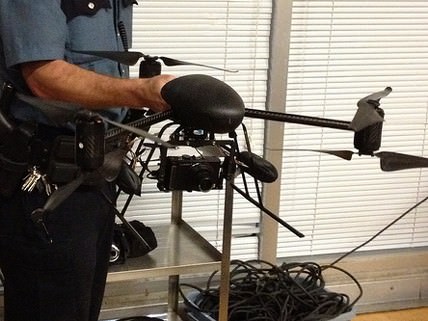Will the Government Test Drones in Your State?

The Federal Aviation Adminstration (FAA) announced that Alaska, Nevada, New York, North Dakota, Texas, and Virginia will serve as test sites for drone planes, and some sites will be operational within 180 days. While we have good reason to be wary of the government's military and surveillance drones clouding our skies, there's no need to blast these particular drones out of the sky. The FAA tests will focus not on building better bombs, but better commerce.
Twenty-five states applied to be drone testing locations, likely enticed by the Association for Unmanned Vehicle Systems International's (AUVSI) study that speculates within the "first three years of integration more than 70,000 jobs will be created in the United States with an economic impact of more than $13.6 billion."
How did the agency make their pick of those six states? The Associated Press (AP) states that "the designation as a test site doesn't come with a financial award from the government," and explains:
In choosing Alaska, the FAA cited a diverse set of test site locations in seven climatic zones. New York's site at Griffiss International Airport will look into integrating drones into the congested northeast airspace. And Nevada offered proximity to military aircraft from several bases, [FAA Administrator Michael] Huerta said.
The extent that lobbying influenced the selection of the sites was unclear.
[…]
The testing will determine whether drones can detect and avoid aircraft and other obstacles, and if they can operate safety when contact is lost with operators.
In 2012, Congress gave the agency three years to integrate "civil unmanned aircraft systems into international airspace." Currently, the vast majority of drones flying over American skies are government operated, though the FAA has begun to permit commercial use on "a case-by-case basis," according to CNN.
The Washington Times warns that bureaucratic sluggishness has already set plans for widespread private use "more than a year behind schedule" and further delays "could put the brakes on the drone revolution and the economic benefits it would bring." Brendan Schulman, who works as special counsel within the drone industry told the Times:
What we've experienced the past several years is a lot of regulatory delay. In the meantime, other countries have moved ahead with permitting and embracing commercial use. Countries like Australia, Canada and the United Kingdom already have a framework for commercial use of drones. That's where you'll see companies going to do the work. That's where you see investment dollars going.
Although the FAA assures that individuals' privacy will not be compromised by these tests, some have still not warmed up to the idea of more drones in America's skies. "Someday drones will be commonplace in U.S. skies and, before that happens, it's imperative that Congress enact strong, nationwide privacy rules," ACLU attorney Catherine Crump told the AP.


Show Comments (10)